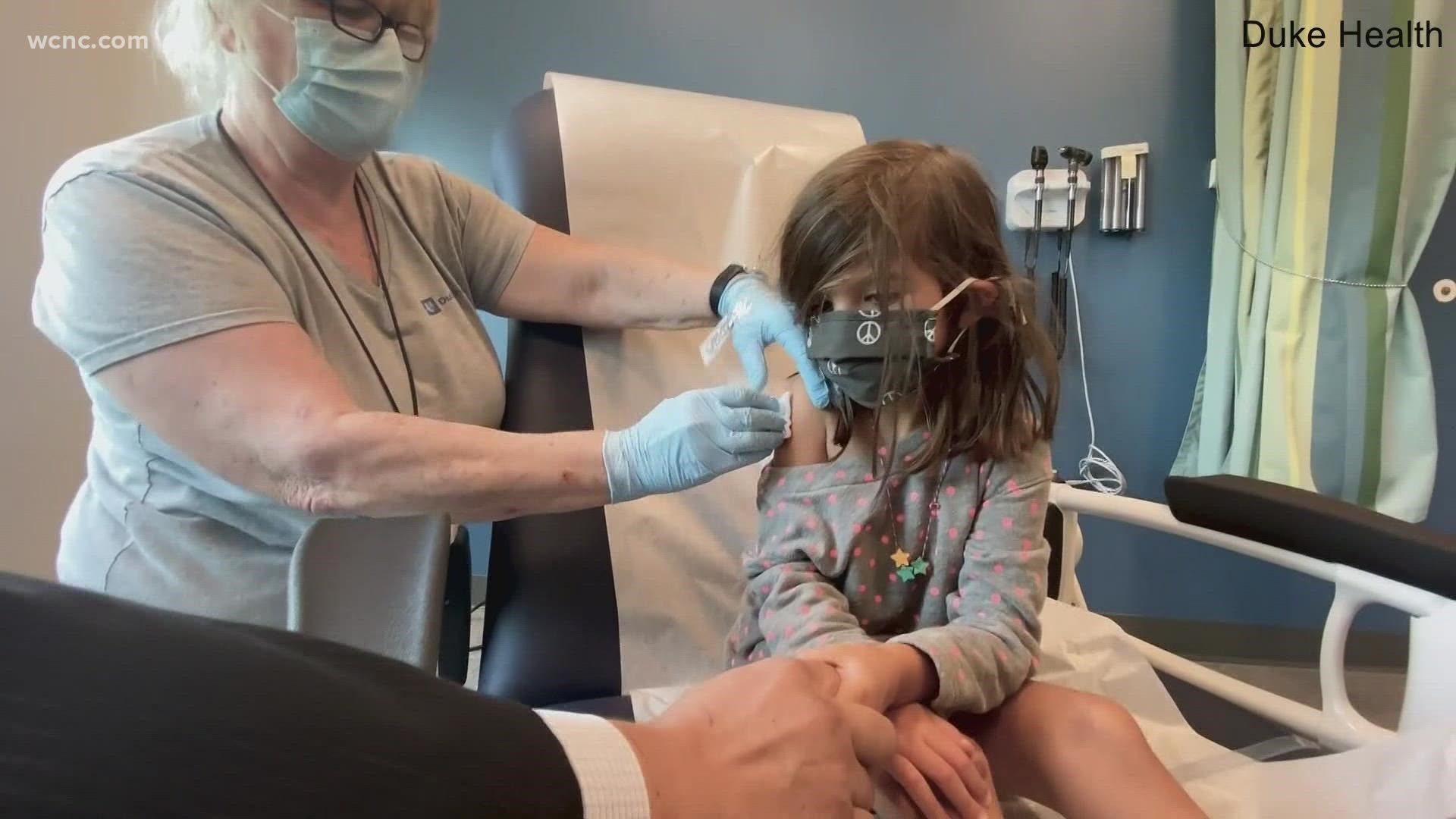CHARLOTTE, N.C. — Charlotte-area vaccine providers are getting ready to give children ages 5 to 11 the Pfizer COVID-19 vaccine. Tuesday, an FDA advisory panel spent hours debating the risks and benefits of the shot and ultimately voted for it to clear this first hurdle.
The CDC advisory panel is set to meet next week and if all goes as expected, kids could be protected against the virus in the next week or so.
A lot of parents now weighing the options.
Five-year-old Lucy is too young to understand the impact of getting a COVID-19 vaccine but for her mom, Lucy’s shot can’t come soon enough.
“Every time she has a cold or a sniffle or a cough, I’m not going to be worried is this delta?" Janelle Fauci said. "Is this COVID? Who has she been around? Has she been around my parents? So, it will reduce some of that anxiety for me."
Janelle Fauci is a doctor with Novant Health but as a mom, feels comfortable getting her daughter vaccinated when the FDA and CDC both give the green light. She pre-booked an appointment for Nov. 8.
“It does have to be a personal decision you have to feel good about it, but I do think it’s the next step in trying to protect our kids,” Janelle Fauci said.
A Kaiser Family Foundation poll found that one-third of parents would vaccinate their children aged 5 to 11 right away, another one-third wants to “wait and see,” and almost a quarter of parents said they definitely would not vaccinate their young kids.
Duke Health helped facilitate the Pfizer vaccine trial in kids. Dr. Chip Walter directs the Duke Vaccine and Trials Unit. He said they looked carefully for side effects and firmly believes this is the right decision.
More than 2,000 kids in the age group took part in the Pfizer trial. Some people are questioning why something tested on thousands should be given to the 28 million American kids in that age range.
“We have to look at this vaccine in total," Walter said. "With the millions of doses that have been administered to adolescents and adults. We can be reassured by that."
He said they looked closely for side effects, specifically myocarditis. The inflammation of the heart muscle has been reported mainly in adolescent boys after vaccination.
“It was examined for in the trial and there were no cases,” he said.
If approved by the FDA and CDC, the dosage given will be a third of what people 12 and older get. But just like adults, it would be two doses given three weeks apart.
Doctors say getting kids vaccinated will keep them protected from hospitalization and the possible complications and long-term effects of a COVID-19 infection.
“Of course it’s a leap of faith but it is the only way we’re going to end up ending this pandemic," Dr. Amina Ahmed with Atrium Health said. "To talk about super spreaders, I call children the silent spreaders. We know now from study that 50% of these kids are asymptomatic but they’re still able to transmit."
Right now, kids make up at least 25% of all COVID-19 cases. Most will have a mild case but it’s not guaranteed.
“In total, we’ve had about 6 million cases in children,” Ahmed said. “But I just want to point out that the impact is much, much greater in children than in adults with the delta surge.”
Some doctors think some parents don’t feel it is an urgent need because many got used to the idea that kids won’t get a severe case of the virus.
“If you look at all these kids that were hospitalized and see how many were in the ICU, all those kids in the ICU were the unvaccinated,” Ahmed said.
Many parents say they are concerned about the lack of data on the long-term effects of a vaccine. Erin Smith is an emergency medicine physician in Charlotte. Her 13-year-old is already vaccinated, and she is excited to get her 10-year-old protected too once it is approved.
Smith said parents from her kids’ schools come to her for advice. Personally, she’s looking at the bigger picture, hoping a shot will give her kids some freedom back.
“There have been studies done and papers written about the increased incidence in depression, anxiety, eating disorders, suicide, suicidal thoughts all from our kids being isolated and quarantined,” Smith said.
Ahmed said people who get immunity from a COVID-19 infection also likely infect other people along the way. Getting this larger population of children vaccinated could get the country closer to herd immunity, with fewer people getting sick.
Contact Chloe Leshner at cleshner@wcnc.com and follow her on Facebook, Twitter and Instagram.

